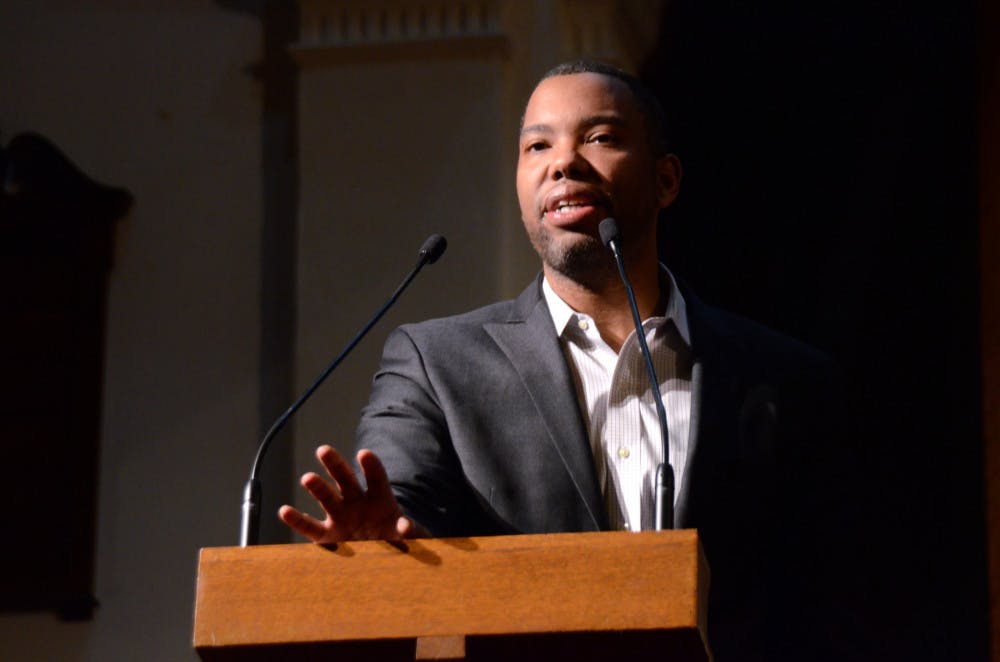Class is not dismissed yet, folks — acclaimed journalist and senior editor for The Atlantic Ta-Nehisi Coates still has a lot to teach us at Middlebury.
Last Wednesday night, hundreds of Middlebury students packed Mead Memorial Chapel to hear Coates’s lecture on his Atlantic cover story “The Case for Reparations.” He reminds us that we can not avoid discussing race in America.
“Racism is an interest … [it is] a product of ignorance,” said Coates as his voice echoed through the hall.
Racism did not stem from race, but rather, race stemmed from racism, Coates argued. Race was a justification for slavery, the exploitation of the black race or as Coates deemed, “the greatest wave of domestic terrorism” in the United States. It was the blood, sweat and tears of 4 million enslaved Africans that merely meant a profit worth $3.5 billion dollars in the eyes of 700,000 white male slaveowners.
“There is no definition of race,” Coates said at the talk.
Race is a social construct, void of biological basis, according to Coates. The need to justify material interest was what brought along “black” and “white.”
Coates argued that the concepts “black” and “white” are quite different. Black is an ethnic group. It represents a myriad of cultures — from food to music to language.
Being black in today’s world holds different context than being black in Sao Paulo, Brazil or in 18th century Louisiana. So if black is an ethnic group, does that mean white is an ethnic group as well? No, Coates claimed. White is privilege.
“White and power cannot be divorced,” he said.
To further his claim, he asked members of the Middlebury community to imagine a world without white supremacy. Would, then, the idea of being white exist? To Coates, no. And there we have it, the chasm between “black” and “white.”
So if we have learned to realize that race is a social construct, why does it matter? Racism is deeply entrenched in American history and is still present today. We see racism through the tragic killings of Eric Garner, Michael Brown and many African Americans of multiple identities. Ferguson does not have a police department, Coates said — it is a “collection agency with guns.”
We see racism through apparent economic disparities between blacks and whites. During the 1940s, African Americans were denied obtaining Federal Housing Administration loans and mortgages. Today, an African American family earning $100,000/year is most likely to reside in a neighborhood where the average white family earns $30,000/year, Coates cited. He also cited that for every $1 a black family has in wealth, a white family has $20.
Until there is a “national consciousness” there will be no reparations and end to racism in America, Coates said. So what do we do? According to Coates, this “national consciousness” begins with the will and courage to have “self-confrontation” with our identity.
Self-confrontation is not being colorblind but 1) realizing that race is a social construct we have been conditioned to accept, 2) freeing ourselves from the limitations social constructs create and 3) realizing that there are no innate differences that justify racism.
Miguel Fernandez, Professor of Spanish and Chief Diversity Officer, reflected on the lecture. “I found Ta-Nehisi Coates’ perspective on race and racism original and thought-provoking,” he said. “His challenges to each of us to question our self identity and to America to live up to the high standards it sets resonated in the aftermath of the Ferguson investigation.”
Coates’ speech also had staying power among students.
“It was so good to see so much of the community, including professors, show up to hear Ta-Nehisi speak,” Molly McShane ’16.5, one of the organizers of JusTalks, said. “I was really struck by his call to action for white people to have the courage to take part in a self-confrontation of our whiteness. I also thought his comments to students were unapologetic and straightforward — the reminder to never mask your identity and think about bigger picture systems of oppression is always good to hear.”
“I was incredibly blown away by how much his speech changed my way of thinking and how his call to action was both powerful and yet accessible to everyone regardless of ‘racial’ background,” Claudia Huerta ’18 said. “I’ve begun to see my own privilege in a new way and am excited to explore what my identity is outside of my race.”
“It is dangerous to know, because to know is to act,” uttered Coates. This is Race 101 and class is not dismissed yet. The conversation on race shall continue. How can we put an end to racial injustice, first starting in the community of Middlebury?
Perhaps first by attending the Ta-Nehisi Coates Lecture follow-up discussion Wednesday, March 11 at 4:30 p.m. in the Coltrane Lounge.
Coates Shakes Campus with “The Case for Reparations”

Comments


